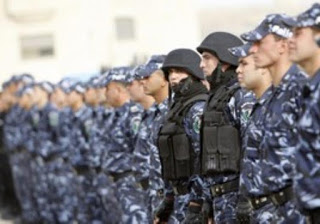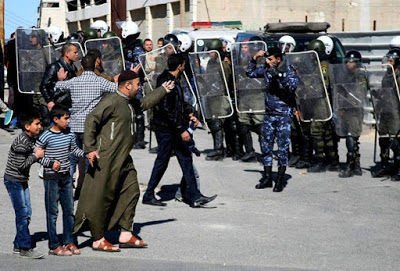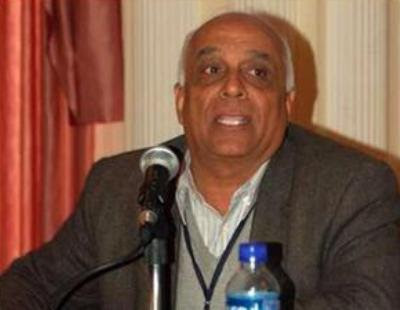 |
| Professor Quassem |
Usually national liberation movements wait until they achieve national
liberation and form the government before they start persecuting dissidents or
their own people. The African National
Congress first overthrew Apartheid before it formed an alliance with the mining
companies, gunning down 34 miners at the Marikana mine.
liberation and form the government before they start persecuting dissidents or
their own people. The African National
Congress first overthrew Apartheid before it formed an alliance with the mining
companies, gunning down 34 miners at the Marikana mine.
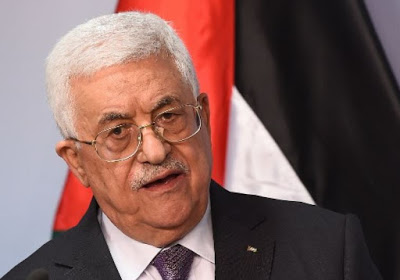 |
| Mahmoud Abbas – Palestineian Quisling President – believes co-operation with Palestinian security is ‘sacred’ |
The quisling Palestinian Authority is different. It presides over a fictitious ‘state’ and
plays a diplomatic game in which it invites other countries to recognise a
non-existent Palestinian ‘state’.
plays a diplomatic game in which it invites other countries to recognise a
non-existent Palestinian ‘state’.
So it is that a distinguished professor at Nablus University, Abdel Sattar Qassem, was arrested for ‘slander,
vandalism, incitement, insulting the president and “hurting the national
feeling.’ It is difficult to understand
how someone can insult that apology for a Zionist footstool, Mahmoud Abbas, when he does such a good job
himself. Someone who could describe the
collaboration by his Palestinian Preventive Security Force with the Israeli
military as ‘sacred’ is beyond doubt a traitor to the Palestinian national
cause.
vandalism, incitement, insulting the president and “hurting the national
feeling.’ It is difficult to understand
how someone can insult that apology for a Zionist footstool, Mahmoud Abbas, when he does such a good job
himself. Someone who could describe the
collaboration by his Palestinian Preventive Security Force with the Israeli
military as ‘sacred’ is beyond doubt a traitor to the Palestinian national
cause.
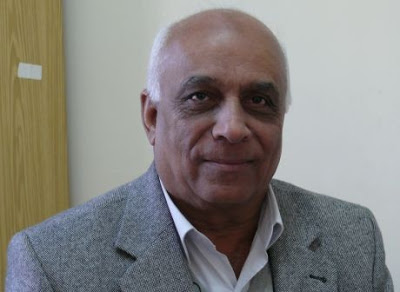 |
| Abdel Sattar Qassem (via Indymedia) |
If there were any justice in the Ramallah bantustan
then the charge of ‘hurting the national feeling’ would be levelled against
Abbas, Dahlan and the other cronies and collaborators in the PA. Perhaps the real reason why Professor Qassem
was arrested was because he called for the prosecution for treason of Palestinian
traitors. Unfortunately, if that were to
happen, then it would be inevitable that the first candidate for prosecution
would be Mahmoud Abbas.
then the charge of ‘hurting the national feeling’ would be levelled against
Abbas, Dahlan and the other cronies and collaborators in the PA. Perhaps the real reason why Professor Qassem
was arrested was because he called for the prosecution for treason of Palestinian
traitors. Unfortunately, if that were to
happen, then it would be inevitable that the first candidate for prosecution
would be Mahmoud Abbas.
It is essential that Palestinian solidarity groups in Britain
and internationally call for the immediate release of Professor Qassem and the
prosecution of those responsible for his arrest and detention.
and internationally call for the immediate release of Professor Qassem and the
prosecution of those responsible for his arrest and detention.
In Britain we should go a step further. It is a disgrace that nationally Palestine Solidarity
Campaign retains friendly relations with the office of the Palestinian Authority
in London, headed by Professor Hassassian.
The Anti Apartheid Movement in Britain did not have relations with Mangosuthu Buthelezi’s Inkatha
Freedom Party, which collaborated with the Apartheid regime. There is no reason why PSC should retain
normal relations with the PA, whose record is as bad if not worse than
Buthulezi’s.
Campaign retains friendly relations with the office of the Palestinian Authority
in London, headed by Professor Hassassian.
The Anti Apartheid Movement in Britain did not have relations with Mangosuthu Buthelezi’s Inkatha
Freedom Party, which collaborated with the Apartheid regime. There is no reason why PSC should retain
normal relations with the PA, whose record is as bad if not worse than
Buthulezi’s.
Tony Greenstein
5 February 2016
 |
| Palestinian Security Forces trained by the Americans, vetted by Israel and employed to suppress Palestinian resistance |
A
Nablus court on Thursday extended the detention of a prominent Palestinian
scholar and longtime dissident whose arrest earlier this week has led to
accusations that he is being politically persecuted by the Palestinian
Authority.
Nablus court on Thursday extended the detention of a prominent Palestinian
scholar and longtime dissident whose arrest earlier this week has led to
accusations that he is being politically persecuted by the Palestinian
Authority.
At
around 11pm on Tuesday, Abdel Sattar Qassem, a 68-year-old professor of
political science at Nablus’
An-Najah National University, and a father of four, was taken from his home,
where he had been staying alone. His wife, Amal al-Ahmad, was not informed of
the arrest and concerned neighbors broke down a door at her prompting to check
whether Qassem had suffered an accident.
around 11pm on Tuesday, Abdel Sattar Qassem, a 68-year-old professor of
political science at Nablus’
An-Najah National University, and a father of four, was taken from his home,
where he had been staying alone. His wife, Amal al-Ahmad, was not informed of
the arrest and concerned neighbors broke down a door at her prompting to check
whether Qassem had suffered an accident.
“I
called him several times but his mobile phone was closed and I got no answer
from the landline,” al-Ahmad, a program coordinator at the Women’s Study Center, told The Electronic
Intifada.
called him several times but his mobile phone was closed and I got no answer
from the landline,” al-Ahmad, a program coordinator at the Women’s Study Center, told The Electronic
Intifada.
Her
fears were compounded by the fact that Qassem’s car was parked outside as
usual. “I was scared that he might have suffered a heart attack or that he
might have been kidnapped,” she said.
fears were compounded by the fact that Qassem’s car was parked outside as
usual. “I was scared that he might have suffered a heart attack or that he
might have been kidnapped,” she said.
It
was only after checking a camera in the family’s home that it became clear
Qassem had been apprehended by Palestinian police. And it took hours still
before she received a phone call from the police telling her that her husband
was in detention.
was only after checking a camera in the family’s home that it became clear
Qassem had been apprehended by Palestinian police. And it took hours still
before she received a phone call from the police telling her that her husband
was in detention.
Outside
the court on Thursday, where Qassem’s detention was extended for another 15
days, a group of civil society activists and friends of the professor held a
vigil demanding his release and an end to political detention and persecution.
the court on Thursday, where Qassem’s detention was extended for another 15
days, a group of civil society activists and friends of the professor held a
vigil demanding his release and an end to political detention and persecution.
His
lawyer, Ahmad Sharaab, the only person to have visited Qassem in detention so
far, is planning an appeal.
lawyer, Ahmad Sharaab, the only person to have visited Qassem in detention so
far, is planning an appeal.
Qassem
faces numerous charges including slander, vandalism, incitement, insulting the
president and “hurting the national feeling.” According
to Adnan al-Damiri, spokesperson of the PA’s
security forces, the arrest came following complaints that Qassem had been
inciting to kill PA leader Mahmoud Abbas.
faces numerous charges including slander, vandalism, incitement, insulting the
president and “hurting the national feeling.” According
to Adnan al-Damiri, spokesperson of the PA’s
security forces, the arrest came following complaints that Qassem had been
inciting to kill PA leader Mahmoud Abbas.
The
charges relate to an interview
Qassem gave on Al Quds TV, broadcast from Beirut, in which he called for
implementing the Palestinian Basic Law which limits presidential terms to four
years.
charges relate to an interview
Qassem gave on Al Quds TV, broadcast from Beirut, in which he called for
implementing the Palestinian Basic Law which limits presidential terms to four
years.
He
also called for the implementation of the Palestine Liberation Organization
revolutionary law, not adapted by the PA, which calls for charges of treason to
be brought against collaborators with Israel, punishable by death.
also called for the implementation of the Palestine Liberation Organization
revolutionary law, not adapted by the PA, which calls for charges of treason to
be brought against collaborators with Israel, punishable by death.
His
appearance fomented a wave of incitement against him by figures allied with the
Palestinian Authority, which remains presided over by Mahmoud Abbas,
even though his elected mandate expired in 2009.
appearance fomented a wave of incitement against him by figures allied with the
Palestinian Authority, which remains presided over by Mahmoud Abbas,
even though his elected mandate expired in 2009.
Constant harassment
Al-Ahmad
says the arrest is only the latest episode of a concerted official persecution of
her husband.
says the arrest is only the latest episode of a concerted official persecution of
her husband.
“The
PA targets my husband because he has repeatedly described security coordination
and collaboration with Israel as grand treason,” al-Ahmad said. “There is no
democracy under the PA. Security forces arrest anyone who freely expresses his
opposition to authority policies.”
PA targets my husband because he has repeatedly described security coordination
and collaboration with Israel as grand treason,” al-Ahmad said. “There is no
democracy under the PA. Security forces arrest anyone who freely expresses his
opposition to authority policies.”
Qassem
writes regularly for Al Jazeera’s Arabic-language website about Palestinian and
Arab affairs. One of his most recently published articles, titled “The
Orphan Uprising,” discusses the current Palestinian uprising, its
challenges, limitations and the failure of the Palestinian leadership to live up
to the sacrifices of the youth.
writes regularly for Al Jazeera’s Arabic-language website about Palestinian and
Arab affairs. One of his most recently published articles, titled “The
Orphan Uprising,” discusses the current Palestinian uprising, its
challenges, limitations and the failure of the Palestinian leadership to live up
to the sacrifices of the youth.
A
staunch opponent of the Oslo accords and
negotiations process with Israel, Qassem, who is not affiliated with any
political faction but is often associated with left-leaning Arab nationalist
views, has been a target of the Palestinian Authority ever since its
establishment. He accused former leader Yasser Arafat of
corruption and regularly condemns Abbas’ security
coordination and contact with the Israeli occupation.
staunch opponent of the Oslo accords and
negotiations process with Israel, Qassem, who is not affiliated with any
political faction but is often associated with left-leaning Arab nationalist
views, has been a target of the Palestinian Authority ever since its
establishment. He accused former leader Yasser Arafat of
corruption and regularly condemns Abbas’ security
coordination and contact with the Israeli occupation.
Qassem’s
work at An-Najah University also did not stop him from criticizing the school’s
administration. He spoke out against what he perceived as corruption at the
institution, which until recently was headed by Rami Hamdallah,
now the appointed PA prime minister. He also published an article criticizing
the university’s refusal to implement a Palestinian court decision halting the
expulsion of four students.
work at An-Najah University also did not stop him from criticizing the school’s
administration. He spoke out against what he perceived as corruption at the
institution, which until recently was headed by Rami Hamdallah,
now the appointed PA prime minister. He also published an article criticizing
the university’s refusal to implement a Palestinian court decision halting the
expulsion of four students.
That
criticism led to his arrest in August 2011 on libel charges brought by the
university. That was his second detention by the PA; in April 2009, he was
arrested by the PA security forces.
criticism led to his arrest in August 2011 on libel charges brought by the
university. That was his second detention by the PA; in April 2009, he was
arrested by the PA security forces.
All
charges were eventually dropped.
charges were eventually dropped.
But
arrests are only a part of the pattern of repression his wife cites. Qassem
survived an assassination attempt by unknown gunmen shortly after being
released from his latest stint in Israeli prison, where he spent a week in July
2014; he was shot in his car while driving to give a television interview
condemning Israel’s massive military assault on Gaza at the time.
arrests are only a part of the pattern of repression his wife cites. Qassem
survived an assassination attempt by unknown gunmen shortly after being
released from his latest stint in Israeli prison, where he spent a week in July
2014; he was shot in his car while driving to give a television interview
condemning Israel’s massive military assault on Gaza at the time.
The
attempt on his life came after several death messages made against him for his
criticism of the PA and Abbas, and following previous assaults by Palestinian
security services, including after his appearance on Al Jazeera at the outset
of the Tahrir Square uprising in Egypt in January 2011. The forces broke into
and vandalized the local television station from where Qassem gave the
interview.
attempt on his life came after several death messages made against him for his
criticism of the PA and Abbas, and following previous assaults by Palestinian
security services, including after his appearance on Al Jazeera at the outset
of the Tahrir Square uprising in Egypt in January 2011. The forces broke into
and vandalized the local television station from where Qassem gave the
interview.
“He
has seen everything: he was shot; his car was burnt; he was beaten. But he
still refuses to be silenced,” al-Ahmad told The Electronic Intifada.
has seen everything: he was shot; his car was burnt; he was beaten. But he
still refuses to be silenced,” al-Ahmad told The Electronic Intifada.
“His
political views and his insistence to speak truth to power has put him under
constant threat from all sides,” she added. “But it hurts more when this threat
comes from the Palestinian Authority. They claim to defend us while jailing and
persecuting Palestinians who resist the occupation.”
political views and his insistence to speak truth to power has put him under
constant threat from all sides,” she added. “But it hurts more when this threat
comes from the Palestinian Authority. They claim to defend us while jailing and
persecuting Palestinians who resist the occupation.”
Lonely struggle
Since
her husband’s latest arrest by the PA, al-Ahmad says she has not received a
single message of support from Qassem’s colleagues at An-Najah.
her husband’s latest arrest by the PA, al-Ahmad says she has not received a
single message of support from Qassem’s colleagues at An-Najah.
He
had a hearing on 3 February, but only a few family members joined al-Ahmad
outside the jail.
had a hearing on 3 February, but only a few family members joined al-Ahmad
outside the jail.
“I
don’t count on professors and intellectuals to support my husband,” al-Ahmad
lamented. “Those people benefit from the PA and they are not prepared to
sacrifice their privileges and face the risks of supporting their colleague.”
don’t count on professors and intellectuals to support my husband,” al-Ahmad
lamented. “Those people benefit from the PA and they are not prepared to
sacrifice their privileges and face the risks of supporting their colleague.”
Two
of Qassem’s colleagues contacted for this article refused to comment on his
court case until it runs its course.
of Qassem’s colleagues contacted for this article refused to comment on his
court case until it runs its course.
Al-Ahmad
does, however, count on the thousands of Qassem’s former students to support
their professor. Some of them turned out for Thursday’s court hearing, during
which Qassem was in high spirits, his wife said.
does, however, count on the thousands of Qassem’s former students to support
their professor. Some of them turned out for Thursday’s court hearing, during
which Qassem was in high spirits, his wife said.
A
coalition of civil society organizations and some political factions are
protesting Qassem’s arrest, putting out a statement calling
for his immediate release as part of the “commitment to preserve civil
liberties and defend freedom of expression.”
coalition of civil society organizations and some political factions are
protesting Qassem’s arrest, putting out a statement calling
for his immediate release as part of the “commitment to preserve civil
liberties and defend freedom of expression.”
Both
the Change and Reform Bloc of parties in parliament — which includes Hamas — as
well as the leftist Popular Front for the Liberation of Palestine have also condemned
the arrest as an attempt to silence independent voices, while Mourid
Barghouti, the Palestinian poet based in Cairo, urged
scholars and writers to speak up against his arrest.
the Change and Reform Bloc of parties in parliament — which includes Hamas — as
well as the leftist Popular Front for the Liberation of Palestine have also condemned
the arrest as an attempt to silence independent voices, while Mourid
Barghouti, the Palestinian poet based in Cairo, urged
scholars and writers to speak up against his arrest.
Lifelong dissident
Born
in the Tulkarem-area
village of Deir al-Ghusoun in 1948, Qassem graduated from the American
University of Cairo with a bachelor’s degree in political science in 1972.
During that period he sought to become engaged
in the Palestinian struggle for liberation. That involvement, however, saw
him grow disillusioned with the Palestinian leadership.
in the Tulkarem-area
village of Deir al-Ghusoun in 1948, Qassem graduated from the American
University of Cairo with a bachelor’s degree in political science in 1972.
During that period he sought to become engaged
in the Palestinian struggle for liberation. That involvement, however, saw
him grow disillusioned with the Palestinian leadership.
He
went on to study at the University of Missouri, where he earned a master’s
degree in economics and received a PhD in political science in 1977.
went on to study at the University of Missouri, where he earned a master’s
degree in economics and received a PhD in political science in 1977.
Qassem
has been a professor of political science at An-Najah in Nablus for more than
three decades and despite persecution by both Israel and the Palestinian
Authority, he has written numerous books, academic papers and articles.
has been a professor of political science at An-Najah in Nablus for more than
three decades and despite persecution by both Israel and the Palestinian
Authority, he has written numerous books, academic papers and articles.
These
cover a variety of issues ranging from political philosophy to Palestinian
history, Islamic studies, women in Islamic thought, contemporary Arab politics,
the demise of Arab intellectuals and US imperialism. He also wrote a book, Days
in Naqab Prison, about his experience as a political prisoner held by
Israel, significantly contributing to prison literature produced by Palestinian
authors.
cover a variety of issues ranging from political philosophy to Palestinian
history, Islamic studies, women in Islamic thought, contemporary Arab politics,
the demise of Arab intellectuals and US imperialism. He also wrote a book, Days
in Naqab Prison, about his experience as a political prisoner held by
Israel, significantly contributing to prison literature produced by Palestinian
authors.
Budour
Youssef Hassan is a Palestinian writer and law graduate based in occupied
Jerusalem. Blog: budourhassan.wordpress.com.
Twitter: @Budour48
Youssef Hassan is a Palestinian writer and law graduate based in occupied
Jerusalem. Blog: budourhassan.wordpress.com.
Twitter: @Budour48
Posted in Blog
